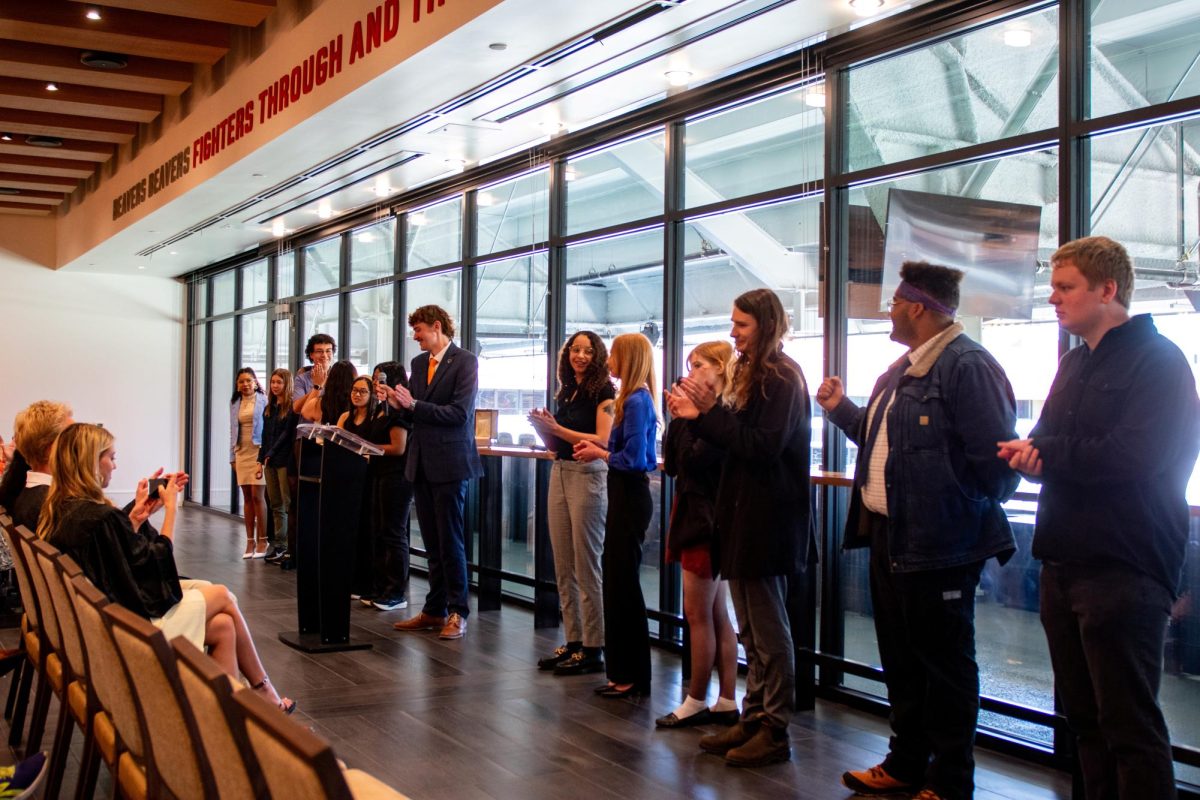On Tuesday evening after much deliberation, the Associated Students of Oregon State University Senate passed Senate Bill 84.14, the “Updated Fiscal Responsibility Act.”
The bill introduces sweeping changes to the management of student incidental fees, emphasizing fiscal accountability and transparency in budgetary decisions.
The bill ensures student fees at OSU are distributed responsibly, transparently, and efficiently by requiring detailed reporting from fee-funded units such as the Memorial Union or Recreational Sports, and setting clear guidelines for financial decision making.
The legislation was authored by the Senate Budgets Committee and mandates detailed financial reporting from student fee-funded units. The Updated Fiscal Responsibility Act aims to expand the Senate’s authority to amend fee bills and establish a default budget should discussions reach a gridlock.
For students, the passage of this legislation signals a growing focus on institutional accountability in managing the fees which fund vital campus programs. This bill also comes at a time of great uncertainty for student worker wages.
According to the original draft of the bill, there has been an average increase of 5.8% in incidental fees over the past 19 years, and the Senate is aiming to address the concerns surrounding these numbers while ensuring efficiency in the allocation of funds.
According to the legislation, “presenting quantitative data alongside qualitative rationale will provide context for better decision-making and offer a clearer picture of units’ budget requests by highlighting key outliers.”
SB 84.14 introduces a mandatory reporting requirement, which obligates units to provide two years’ worth of data on their budgets, expenditures, and wage structures. This data will not only provide senators with a clearer picture of how funds are used, but also offer long-term stability in the budgeting process.
Additionally, the bill clarifies the Senate’s authority to amend fee bills, which, if met with contention or dispute, the legislation establishes a mediation process.
According to SB 84.14, “If fee bills are amended by the Senate they shall be returned to a mediation committee with a rationale as to the reason behind the amendment.”
To avoid budgetary delays, a default budget mechanism was included, which forwards an inflation-adjusted budget if the mediation committee cannot finalize a proposal in time.
“If the mediation committee fails to provide a recommendation by a date specified by the Senate, or if the changes proposed by the mediation committee fail to pass the Senate, the fee bill defaults to the most recently amended version and if voted on is thus passed to the ASOSU President,” the bill states.
Senate deliberations were robust, with senators debating over multiple versions of key Sections to the bill. More specifically, Sections B and G, with Senator President Pro Tempore Adison Rowe. Rowe stating they believed Section B to be the most controversial.
Section B of the bill addresses the Senate’s authority to amend fee bills and came under controversy last year when the ASOSU Judicial Council delivered an opinion stating; since the ability to amend fee bills is not explicitly stated, it is thus outside the scope of powers of the Senate. This opinion came after years of Senate precedent in which the ability (to amend fee bills) was allowable.
Section B explicitly sets the Senate’s formal authority to amend fee bills. The Senate motioned to adopt Version C of Section B—a compromise granting amendment authority but requiring mediation in cases of significant changes.
Section G, detailing the default budget mechanism, also drew mixed reactions from the Senate. With some senators arguing for its removal, suggesting it be introduced as a standalone bill.
“I am personally opposed to Section G as it is written. I think that we could remove the section from this bill and consider it as its own bill,” Sen. Rowe said.
Other members of the Senate supported the inclusion of Section G, seeing it as a safeguard against financial uncertainty. “I like the idea of having some sort of cushion,” Senator Donovan Morales-Coonrad said.
After a lengthy debate, the Senate motioned to retain Section G in an 8 aye, 3 nay and 5 abstention decision. Reflecting a mix of strong support and lingering reservations among senators.
However, Sophia Nowers, Student Fee Committee Chair, expressed cautious optimism about the legislation. “If we get to that deadline (the mediation committee date set by the Senate), this makes it so that we will have a basic fee request for next year. This essentially removes the worst-case scenario. Just to have this as a safeguard, in an ideal world we will hopefully not be able to use it.”
With SB 84.14 now passed, attention shifts to the ASOSU President’s desk for final approval.














































































































